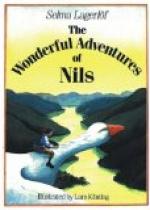The warmth and the spring-budding had tempted the people out into the gardens and roads, and wherever a number of them were gathered together they were playing. It was not the children alone who played, but the grown-ups also. They were throwing stones at a given point, and they threw balls in the air with such exact aim that they almost touched the wild geese. It looked cheerful and pleasant to see big folks at play; and the boy certainly would have enjoyed it, if he had been able to forget his grief because he had failed to save the city.
Anyway, he had to admit that this was a lovely trip. There was so much singing and sound in the air. Little children played ring games, and sang as they played. The Salvation Army was out. He saw a lot of people dressed in black and red—sitting upon a wooded hill, playing on guitars and brass instruments. On one road came a great crowd of people. They were Good Templars who had been on a pleasure trip. He recognized them by the big banners with the gold inscriptions which waved above them. They sang song after song as long as he could hear them.
After that the boy could never think of Gottland without thinking of the games and songs at the same time.
He had been sitting and looking down for a long while; but now he happened to raise his eyes. No one can describe his amazement. Before he was aware of it, the wild geese had left the interior of the island and gone westward—toward the sea-coast. Now the wide, blue sea lay before him. However, it was not the sea that was remarkable, but a city which appeared on the sea-shore.
The boy came from the east, and the sun had just begun to go down in the west. When he came nearer the city, its walls and towers and high, gabled houses and churches stood there, perfectly black, against the light evening sky. He couldn’t see therefore what it really looked like, and for a couple of moments he believed that this city was just as beautiful as the one he had seen on Easter night.
When he got right up to it, he saw that it was both like and unlike that city from the bottom of the sea. There was the same contrast between them, as there is between a man whom one sees arrayed in purple and jewels one day, and on another day one sees him dressed in rags.
Yes, this city had probably, once upon a time, been like the one which he sat and thought about. This one, also, was enclosed by a wall with towers and gates. But the towers in this city, which had been allowed to remain on land, were roofless, hollow and empty. The gates were without doors; sentinels and warriors had disappeared. All the glittering splendour was gone. There was nothing left but the naked, gray stone skeleton.




